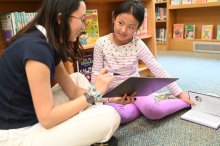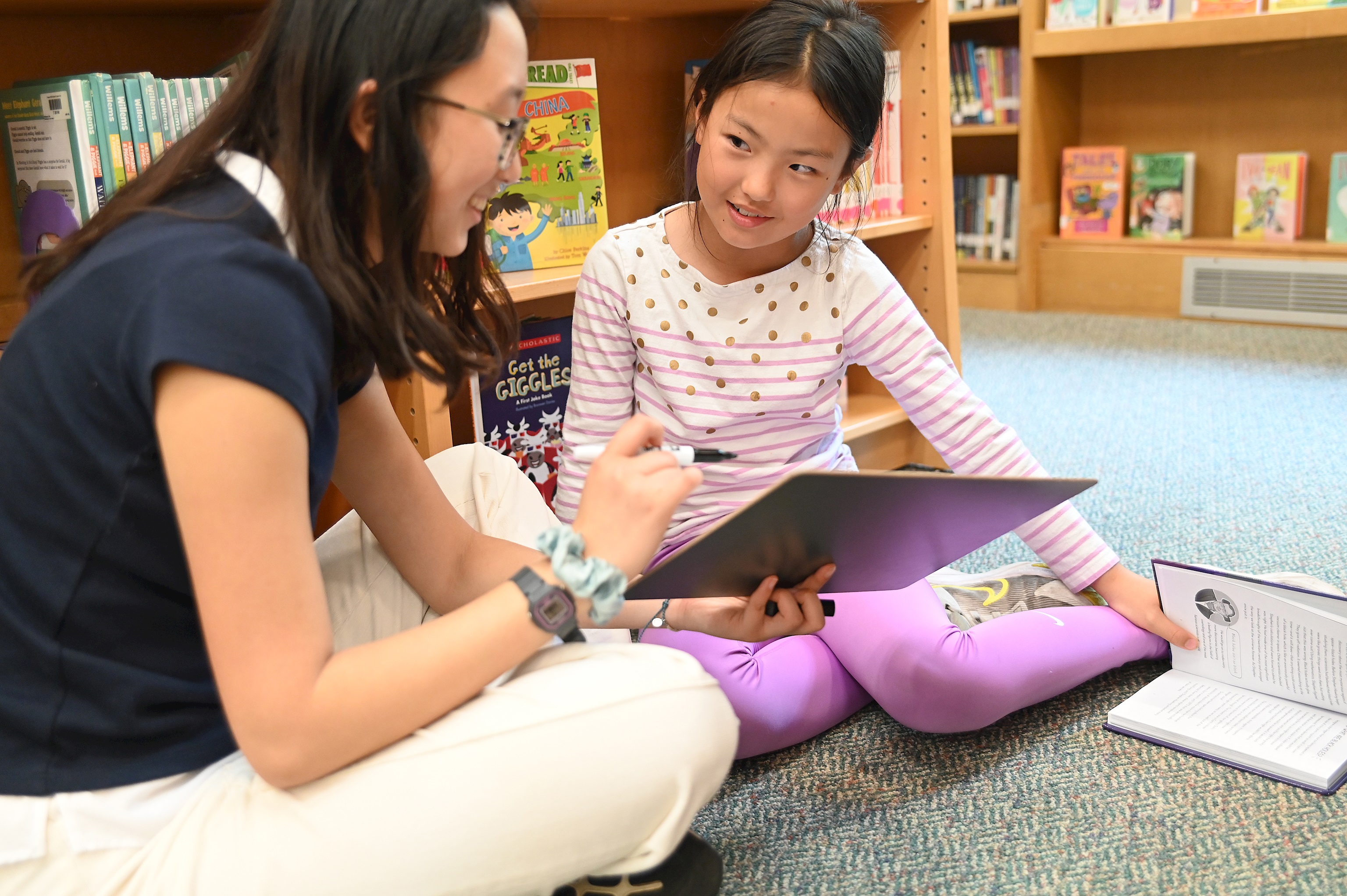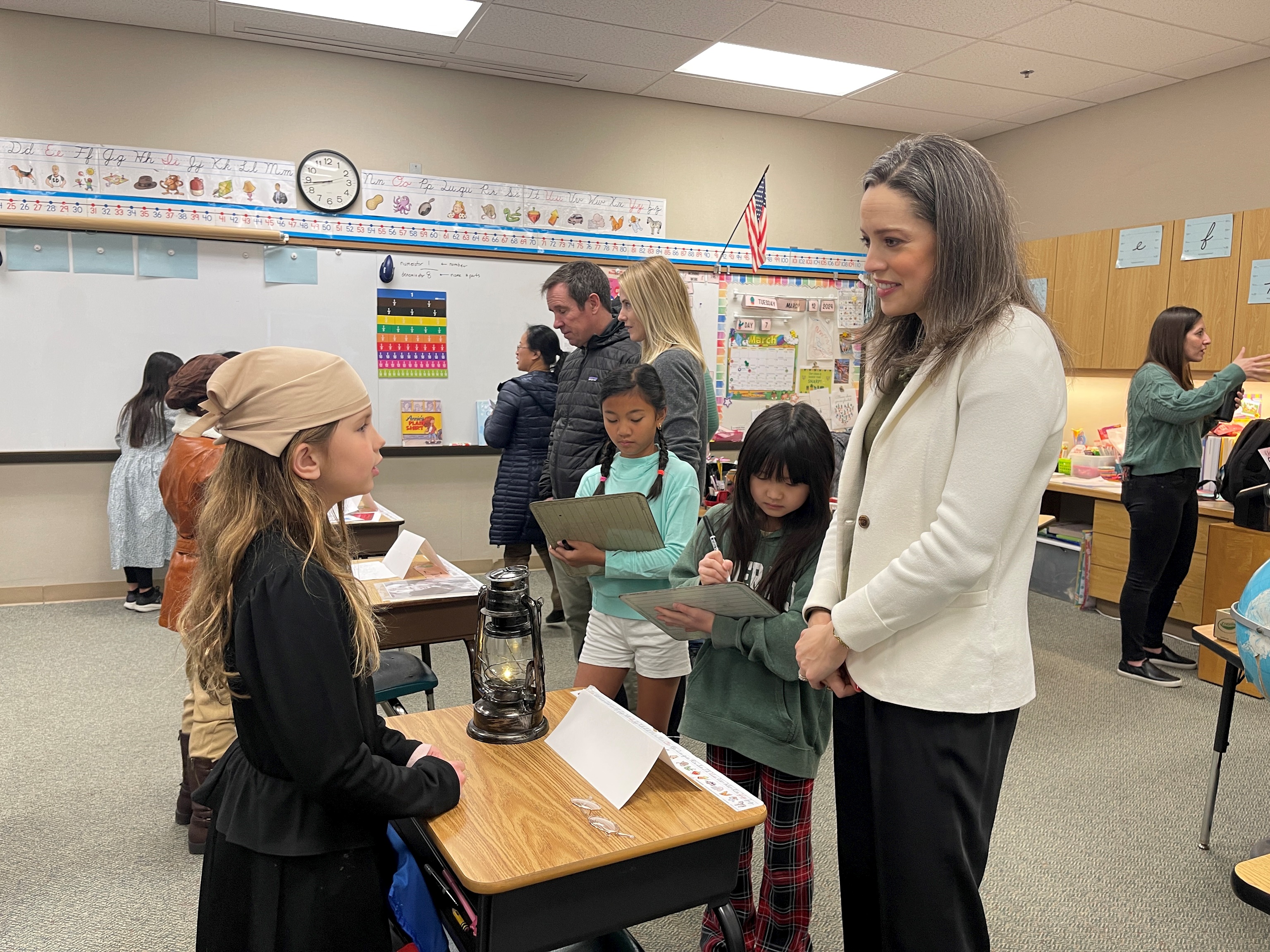
By Amy Bickhart, Head of Lower School
From ages past and present, the one milestone relished the world over is a child’s first word. It signals the start of a growing vocabulary and an ability to reach “for full engagement with a dynamic world.”
These are the opening words of Tower Hill’s mission statement, and the crux of the philosophy behind our educational programming.
Communication, one of the five Cs of education, is alive and strong at Tower Hill, and it begins in the Lower School. Students are immersed in a language-rich environment that enables them to explore, practice and express their ideas, emotions, thoughts and opinions in a way that fosters the development of one of life’s most crucial skills: effective dialogue. By engaging in reading, writing and speaking, students together gain insights into the subtleties of constructive communication.
READING
Classroom teachers, the school librarian and families are the gateway to our children’s first relationship with reading. Beginning with read-alouds, the listener is swept into imaginary worlds of adventure and discovery. They connect with characters, listening to their interactions and discovering the meaning behind the written word. This is the perfect setup for putting a book in a student’s hands. The beauty of reading is that it is relational, inwardly and outwardly, and can be shared among students, especially in a shared schoolhouse.
Two years ago, the Book Buddy program began, led by Lower School Teaching and Learning Literacy Specialist Ellen Ellis. This popular, one-on-one afterschool program pairs Upper and Lower School students together as Book Buddies, meeting once a week to share in the joy of reading. But there is much more to their time together. Lower School students are provided with role models, experience one-on-one time with a mentor outside of their family and gain confidence and self esteem. Upper School students become leaders and mentors, liaising with families and empowering their younger Buddy with strategies and materials to enhance reading and writing. Overall, it is the human connection made through a common interest in reading that drives the program.
“It was fun to spread my love for reading to younger kids and show them why I love it,” shares an Upper School Buddy. “It was also very fun to go back and read some old classics from my childhood. My time as a Book Buddy this year allowed me to realize why tutoring young kids is so important and how it not only helps them but also helps me. It gives me time after a long day to focus on someone else and their progress. Leaving behind the day I had to help someone else was a real eye-opening experience for me and I loved every part of it.”
“Book Buddies has been a fantastic experience for our child.” The parents of a Lower School Buddy agree, “The Upper School student has been incredibly responsive and maintains regular communication with us, which we greatly appreciate. More importantly, the program has helped our child form meaningful connections and feel a sense of belonging at the school, especially since this is her first year at Tower Hill. She looks forward to it every week and I’m thrilled to see her so engaged. She’s even mentioned that she hopes to become a mentor for a younger Book Buddy when she’s older.”
WRITING
Like reading, writing is transformative. It is another relational way for our students to express themselves. For example, Freezer Fridays—a day first through fourth graders look forward to most—is dessert day. The yellow freezer, stocked with rocket pops, ice cream cups and other tasty treats, is wheeled out to a long line of students, patiently and eagerly waiting to choose a frozen confection.
There is one exception—kindergarteners are treated to cookies on Friday instead, which are also delicious. But one can only imagine what it is like to be a kindergarten student, watching every Friday as the older kiddos excitedly grab their favorite frozen treat.
Recognizing that they too wanted to experience this occasion, the younger students had an idea inspired by learning about persuasive writing—they began brainstorming reasons why they, too, should be granted the chance to partake in a Freezer Friday. This exercise was a perfect culmination of their persuasive writing unit.
I promptly received a letter from the three kindergarten classes intended to persuade me to include kindergarten in the weekly tradition of Freezer Friday. The opportunity for the students to express why they deserved to put the cookies aside for ice cream exercised the lesson that, when backed up with valid reasoning, change can be accomplished.
Suffice it to say, one of my most memorable moments from the year was the sound of their cheers when they learned their persuasive letter had attained its goal, as were the smiles and ice-cream-covered mouths that came the following Friday.
SPEAKING
Moving from the written to the spoken word, Lower School students gain lifelong public speaking skills—another important component of effective dialogue. One of the highlights of third grade is the Changemaker project. Students choose a changemaker in history and will assume their persona. This project brings out athletes, inventors, scientists, Presidents, leaders, creatives and trailblazers.
During the research phase, and in preparation for their presentations, the students gain skills in public speaking through theater class with teacher Renee Liciaga, where they learn projection, tone, fluency, volume, eye contact and more.
This past year’s Changemaker Museum treated attendees to visits with Ruth Bader Ginsberg, Babe Ruth, Steve Irwin, Amelia Earhart and many more. Having become one with their changemaker, students shared their lives as though they were their own, proudly and with confidence. There was no doubt after listening to their words that we have future changemakers in our midst.
Coming together through words-read, written and spoken-we are becoming great communicators, one of life’s most essential skills. Gathering all of our voices, we are extraordinary together!








